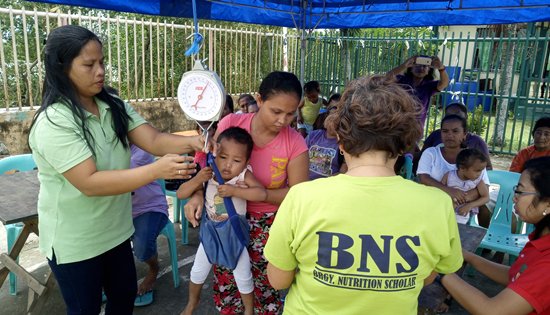NEWS
Save the Children Philippines pushes vaccination vs. measles to prevent rising deaths of children
Press Release
January 8, 2019
MAKATI CITY – Save the Children Philippines called on parents and health workers to intensify measles vaccination due to the steady rise of deaths among children caused by complications from the preventable disease.
Lawyer Albert Muyot, chief executive officer of Save the Children Philippines said there is a need to dispel the public scare against vaccination in general as it has prevented mothers from having their children immunized.
A scare against vaccination spread in the Philippines because of the Dengvaxia vaccine against dengue.
“Parents and community health workers must be at the forefront of the campaign to dispel the public scare against measles vaccination to make sure children do not die from the preventable disease,” said Muyot.
The number of deaths from measles, mostly children climbed five times to 17,289 between January to November 2018, compared to 3,706 cases recorded during the same period in 2017, according to the Department of Health.
The recently passed First 1,000 Days law highlights the need for complete immunization of babies including measles vaccines before they reach one year old. It also ensures children’s health and nutrition and better performance in schools.
Dr. Amado Parawan, health and nutrition advisor of Save the Children Philippines said immunization is important to ensure herd immunity of children from the airborne virus of measles.
He said measles vaccine has been used in the country for four decades and has prevented deaths and diseases among children since then.
“We cannot compare measles vaccines which have been proven to be effective in saving the lives of children from the life threatening disease to the newly developed Dengvaxia, which is the subject of the public scare,” said Parawan.
He said measles virus is airborne and easily transferred among infants and children who have not been vaccinated.
“Complications from measles are pneumonia and diarrhea, which are also the top two leading causes of deaths among children,” said Parawan.
Save the Children Philippines has been implementing maternal and child health and nutrition programs among poor families in Navotas, Malabon, Caloocan through access to immunization, prenatal check-ups for pregnant mothers and training of community health workers.
Copy-Paste: A bad practice in OPTs

By RAY GASPAY
June 11, 2018
CATBALOGAN CITY – Copy-paste. This was the issue found and concern aired by the Municipal Nutrition Action Officers (MNAOs) of Babatngon and Capoocan, both of Leyte province, to media during the 2-day Media Caravan conducted on June 7-8, 2018 by the Harmonized Initiative of Media for the Spread of Good Nutrition in Region 8 (HIMSOG-8), a media arm of the National Nutrition Council 8.
“We do not believe that we are in the top rank of a municipality with a high prevalence of malnutrition in the region. We see the ‘copy-paste’ practice of some of our BNSs (Barangay Nutrition Scholars) as the culprit of this erroneous result in the OPT (Operation Timbang)”, lamented the MNAOs during the open forum of the media visit.
The MNAOs argued that some of their BNSs, because of the urgency to submit their Barangay OPT result before the deadline, tend to copy the previous year’s OPT result, consequently providing a wrong data entry with a higher rate of malnutrition.
When media asked that they should tell their BNS to conduct the weighing and growth monitoring activity with diligence, they claim that still some of their BNSs needs more training to perform the task well. Capoocan MNAO admitted that it is hard for her to demand better performance to her BNSs because they only received a minimal amount of P100-P300 a month honorarium from their barangay, and that her municipality cannot provide them additional pay.
In the 2017 Prevalence of Malnutrition result, Babatngon and Capoocan ranked 1 and 2 in the prevalence of stunting rate, ranked 29 and 92 in the prevalence of wasted and severely wasted, ranked 1 and 98 in the prevalence of underweight and severely underweight, and ranked 25 and 6 in the prevalence of overweight and obesity, all respectively from out of 134 municipalities in the region.
The HIMSOG-8 media caravan is an annual activity of the regional media group to visit selected municipalities in the region whose aim is to encourage LGUs to invest more and enhance its programs on nutrition. It is also a forum where issues of concern are discussed in detail, resolved or referred to the concerned office or officials for an immediate action.
This year’s caravan centers more on eight (8) nutritionally depressed municipalities in the region.
PPAN launched to curb malnutrition in next 6 years

Press Release
May 5, 2017
TAGUIG CITY – All is set for the Philippine Plan of Action for Nutrition (PPAN) 2017-2022 in addressing malnutrition in the country for the next six years as it was officially launched on 2 May 2017 in Iloilo City. Health Secretary Paulyn Ubial led the national launch together with other members of the Governing Board of the National Nutrition Council.
Anchored on the Philippine Development Plan, the PPAN is the country’s contribution to the attainment of Sustainable Development Goals (SDGs) of the United Nations, particularly SDG 2 which is to end hunger, achieve food security and improved nutrition and promote sustainable agriculture. Moreover, PPAN 2017-2022 also aims to support the World Health Assembly Global Target to improve maternal, infant and young child nutrition by 2025.
The new PPAN is a results-based plan designed to achieve significant reductions in different forms of malnutrition such as wasting, stunting, micronutrient deficiencies and overweight and obesity in the Philippines. It was constructed based on a landscape situational analysis of nutrition in the Philippines which shows that the prevalence of malnutrition in various forms remain high.
Based on the National Nutrition Survey conducted by the Food and Nutrition Research Institute (FNRI) in 2015, 33.4% or 3.8 million children are stunted while 7.1% or 807,057 are wasted. It also showed that overnutrition manifesting as overweight and obesity are emerging health concerns among children and a major problems among adults with 18 million Filipinos who are overweight and obese.
Micronutrient deficiency which adversely affects a child’s survival also remains a public health concern. Among pregnant women, 24.8% are nutritionally at risk with iodine deficiency disorder affecting brain development of unborn and very young children. The cost of malnutrition greatly affects the country’s economy with a total loss of P328 Billion in 2013 due to impacts of child stunting on education and productivity.
As key to achieving improvement in nutritional outcomes, PPAN’S strategic thrusts are the First 1,000 Days of life, complementation of nutrition-specific and nutrition-sensitive programs, intensified mobilization of local government units and reaching Geographically Isolated and Disadvantaged Areas (GIDAs) and communities of indigenous peoples.
The new PPAN features 8 nutrition-specific programs devised to address the immediate causes of malnutrition such as inadequate food and nutrient intake, poor caregiving and parenting practices, and the burden of infectious diseases. This will be complemented by nutrition-sensitive programs which are already existing developmental programs that can be tweaked to produce nutritional outcomes. These programs will be enabled by intensive mobilization of LGUs which will involve capacity-building and mentoring on nutrition program management.
The PPAN 2017-2022 was approved by the NNC Governing Board during its 1st meeting on 21 February 2017.

Save the Children report: PH economy loses P328 billion a year due to malnutrition
By Save the Children Philippines
August 30, 2016
MANILA – A new report released today by Save the Children reveals that the Philippine economy is losing at least P328 billion a year due to the impact of childhood stunting on workforce productivity and education. Stunting is the most prevalent form of undernutrition, and has permanent effects on a child’s growth and development.
The report entitled “Cost of Hunger: Philippines” suggests that, in 2013, childhood stunting cost the Philippines almost 3 percent of its GDP. The overall economic loss of P328 billion consists of:
1) P166.5 billion worth of lost income as a result of lower level of education achieved by the working population who suffered from childhood stunting;
2) P160 billion in lost productivity due to premature deaths among children who would have been members of our current working-age population;
3) P1.23 billion in additional education costs to cover grade repetitions linked to undernutrition.
Ned Olney, Save the Children Philippines Country Director, said: “This study proves that undernutrition has a cost to all of us. In just a year, Philippines has lost almost 3 percent of its GDP in terms of education and productivity costs due to stunting. If we add up health costs, the likely impact would be an additional 0.05 - 1.6 percent.”
The report shows that stunting is the best predictor of productivity and income, and that undernutrition is linked to lower human capital. Children who are stunted in the first two years of life are more likely to repeat grade levels, drop out of school, delay school entry and have lower income levels when they enter the workforce.
Olney added: “If stunting rates continue to rise, it would be difficult for families to break free from poverty. It is the poor and neglected sectors of society that carry the burden of stunting. Any investment in reducing childhood undernutrition will reduce suffering and poverty, and will ultimately stimulate economic growth for all Filipinos.”
The report found, however, that Philippines’ investment in nutrition programs is very low at only 0.52 percent of general government expenditures compared to the global average allocation of 2.1 percent. Citing the report findings, Save the Children highlighted the need to invest in nutrition programs during the child’s first 1000 days, from pregnancy up to the second birthday, which is considered a critical period of care to avert stunting.
Olney said: “Nutrition is the cornerstone of all development efforts. This new report tells us that for every US$1 spent on programs to avert stunting in children below 2 years old, the Philippines could save over 100 US dollars in health, education, and lost productivity costs.”
“It should outrage us that 95 children will die every day because of malnutrition.”

Save the Children is raising the alarm on the nutrition crisis, and is calling the national and local government, private sector and the donors to end the appalling state of malnutrition in the Philippines:
• Support the “First 1000 Days Bill” to enhance the delivery of quality nutrition interventions in the first 1000 days of a child’s life to prevent stunting among children.
• Push and sustain equitable nutrition policies and programs and ensure budgetary allocations that address the immediate, underlying and basic causes of malnutrition.
• Ensure security of tenure and sustained training of the community front-liners e.g. such as barangay health workers and nutrition officers and scholars. Health and nutrition workers are highly politicized, lack incentives and support for trainings, have no security of tenure.
• National and local governments provide clear and separate budget for nutrition-specific interventions to avoid confusion between health and nutrition budgets.
• Intensify health and nutrition-related training, research and extension support activities to support the First 1000 Days Program through the Barangay Integrated Development Approach for Nutrition Improvement (BIDANI) Network Program of the Rural Poor and other relevant approaches, thereby strengthening delivery systems in partnership with the LGUs.
• Scale up cost-effective and affordable high-impact nutrition interventions to prevent undernutrition that cripples the country, such as promotion of exclusive breastfeeding, complementary feeding, vitamin A and iron supplementation, treatment of acute malnutrition and maternal nutrition.
• Strengthen enforcement of the Milk Code (Executive Order Number 51), and the Expanded Breastfeeding Promotion Act (Republic Act Number 10028) to protect, promote, and support optimal infant and young child feeding, both in private and public facilities and spaces.
• We call for the strict and sustained implementation of nutrition-specific interventions, including infant and young child feeding (IYCF), micronutrient supplementation and the Community Management of Acute Malnutrition (CMAM), which is now required to be implemented nationwide.
• Revise conditionalities under the government’s Pantawid Pamilyang Pilipino Program (4Ps) to include mandatory breastfeeding and education sessions on infant and young child feeding.
• Align health and nutrition programs to the priorities and directions of the Philippine Plan of Action for Nutrition and the Strategy for Women, Infant, and Young Child Nutrition.
• Increase the focus on water, hygiene and sanitation interventions for children by targeting child-related behaviors and risk factors, such as safe disposal of human waste, complementary food hygiene and handwashing and intensifying promotion of Philippine Approach to Total Sanitation (PhATS) program to reinvigorate our country’s progress towards the national goals of eliminating open defecation.
Right Start Initiative to scale up nutrition for 100 million women and girls – launched today by the Micronutrient Initiative
Via MARKETWIRE
May 18, 2016
COPENHAGEN, Denmark – One hundred million women and girls worldwide will have access to better nutrition, thanks to the Right Start Initiative launched today by the Micronutrient Initiative (MI), with the support of the Government of Canada.
Malnutrition remains one of the most persistent barriers to human development and it limits the capacity of generation after generation of women and girls to grow, learn, earn and lead. One billion women and girls are malnourished – and the cost of that lost potential undermines global progress in multiple areas of human endeavour, including our capacity to achieve the Sustainable Development Goals (SDGs).
Today, Canada reinforced its global leadership on nutrition by supporting the Micronutrient Initiative in launching the Right Start Initiative, a ground-breaking investment platform with aim of reaching 100 million women and girls with improved nutrition by 2020.
"We are in 2016 and yet one billion women and girls around the world are malnourished. Canada recognizes the importance of investing in initiatives like Right Start to change the status quo for women and girls around the world," said Marie-Claude Bibeau, Canada's Minister for International Development and La Francophonie.
The Right Start Initiative has five strategic pillars, including high impact programs, partnerships, resource mobilization, technical assistance and advocacy. Right Start aims to rally the international development community to generate the know-how, resources and solutions necessary to empower women and girls through improved nutrition.
With $75 million in anchor support already invested by the Government of Canada, MI is launching programs in nine countries across Africa and Asia that will reach 50 million women and adolescent girls by 2020.
Now, MI is using those strategic investments as a launch point for leveraging additional support, from donors, countries and partners, to double its impact. Canada's support has already generated additional support, including a $1.5 million investment from the Australian Agency for International Development and a strategic partnership with the government of Indonesia to improve nutrition for one million pregnant women and children in two of Indonesia's high burden provinces.
"Malnutrition is one of humanity's longest running battles," said Joel Spicer, President and CEO of the Micronutrient Initiative. "The question all of us need to start asking is how do we bring about the beginning of the end of malnutrition? Initiatives like Right Start are a spark that moves us closer to the answer. It starts by doing much more for women and girls."
